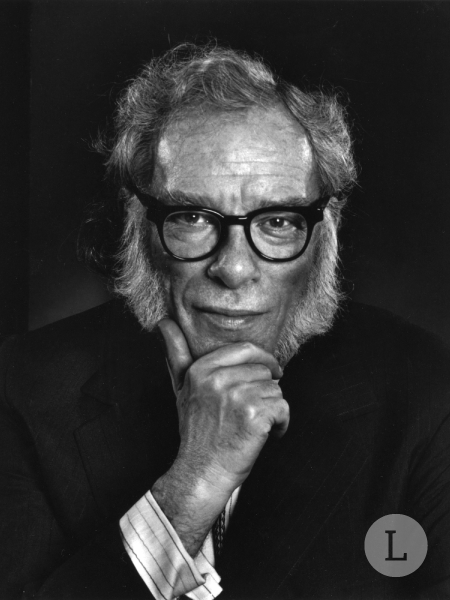
born: JANUARY 2, 1920
died: APRIL 2, 1992
nationality: AMERICAN
genre: SCIENCE FICTION
Isaac Asimov was a prolific writer and biochemistry professor, best known for his contributions to the science fiction genre. Asimov’s work encompasses hundreds of novels and short stories, as well as popular science books and essays. This article provides an in-depth look at Asimov’s life, early education, career highlights, top books, interesting facts, and his lasting impact on the literary world.
EARLY LIFE AND FAMILY BACKGROUND
Isaac Asimov was born on January 2, 1920, in Petrovichi, Russia, to Anna Rachel Berman and Judah Asimov. In 1923, his family emigrated to the United States and settled in Brooklyn, New York. Asimov’s love for reading and writing began at a young age, and he became a voracious reader of science fiction magazines.
Asimov graduated from high school at the age of 15 and went on to attend Seth Low Junior College, which was later absorbed by Columbia University. He eventually earned a Bachelor of Science degree in chemistry in 1939, a Master of Arts degree in chemistry in 1941, and a Doctor of Philosophy degree in biochemistry in 1948, all from Columbia University.
CAREER AND LITERARY SUCCESS
Asimov began his writing career in the early 1940s, with his first published story, Marooned off Vesta, appearing in Amazing Stories magazine in 1939. His early work primarily focused on science fiction, and he quickly gained recognition in the field.
Asimov’s most famous series, the Foundation series, began with a series of short stories published in science fiction magazines between 1942 and 1950. These stories were later compiled into a trilogy: Foundation (1951), Foundation and Empire (1952), and Second Foundation (1953). The series explores the concept of psychohistory, a fictional science that uses statistical analysis to predict the future of large populations.
Asimov also wrote the Robot series, which includes the influential short story collection I, Robot (1950). This series introduced the Three Laws of Robotics, which have since become a cornerstone of science fiction literature and influenced the field of robotics.
In addition to his science fiction work, Asimov was a prolific writer of popular science books and essays, making complex scientific concepts accessible to the general public.
TOP 10 BOOKS BY ISAAC ASIMOV
Foundation (1951)
The first book in the Foundation series, this novel introduces the concept of psychohistory and follows mathematician Hari Seldon as he establishes a foundation to preserve knowledge and guide humanity through a dark age.
Foundation and Empire (1952)
The second book in the Foundation series, this novel explores the fall of the Galactic Empire and the rise of the Foundation as it faces challenges from within and without.
Second Foundation (1953)
The third book in the Foundation series, this novel reveals the existence of a second, secret foundation and the struggle for control of the galaxy.
I, Robot (1950)
A collection of nine short stories that introduced Asimov’s Three Laws of Robotics and explored the relationship between humans and robots.
The Caves of Steel (1954)
The first novel in the Robot series, featuring detective Elijah Baley and his robot partner, R. Daneel Olivaw, as they solve a murder mystery in a future Earth society where robots and humans coexist.
The Naked Sun (1957)
The second novel in the Robot series, featuring detective Elijah Baley and R. Daneel Olivaw, as they investigate a murder on the planet Solaria, where humans live in isolation and rely heavily on robots.
The Gods Themselves (1972)
A standalone novel that explores the consequences of an energy exchange between parallel universes, with themes of scientific ethics and environmentalism.
Nightfall (1990)
Co-written with Robert Silverberg, this novel expands on Asimov’s famous short story of the same name, exploring a world plunged into darkness and chaos when its six suns set simultaneously.
Prelude to Foundation (1988)
A prequel to the Foundation series, this novel follows a young Hari Seldon as he develops the concept of psychohistory and navigates the complex politics of the Galactic Empire.
The End of Eternity (1955)
A standalone time-travel novel that explores the implications of a secretive organization that manipulates history to prevent future disasters.
INTERESTING FACTS FROM ISSAC ASIMOV’S LIFE
- Asimov was a prolific writer, with more than 500 books and 90,000 letters and postcards to his name.
- He was a member of the all-male literary club The Trap Door Spiders, which also included other famous science fiction authors, such as Robert Heinlein and L. Sprague de Camp.
- Asimov coined the term robotics in his 1941 short story Liar!
- Despite his extensive knowledge in various fields, Asimov never learned to drive a car.
- Asimov had a famous fear of flying, which he overcame later in life to attend science fiction conventions and deliver lectures around the world.
AWARDS & HONORS
Throughout his career, Isaac Asimov received numerous awards and honors, including:
- The Hugo Award for Best All-Time Series for the Foundation series (1966)
- The Nebula Award for Best Novel for The Gods Themselves (1972)
- The Hugo Award for Best Novelette for The Bicentennial Man (1976)
- The Bram Stoker Award for Lifetime Achievement (1990)
- Induction into the Science Fiction and Fantasy Hall of Fame (1997, posthumously)
Isaac Asimov’s exceptional contributions to literature, particularly in the science fiction genre, have earned him a place among the greats in literary history. His works continue to be celebrated and enjoyed by readers worldwide, ensuring his legacy will endure for generations to come.
DEATH AND TIMELESS LEGACY
Isaac Asimov passed away on April 6, 1992. His vast body of work, encompassing science fiction, popular science, and numerous other genres, has left a lasting impact on literature and the fields of science and technology. Asimov’s influence can be seen in the works of numerous contemporary authors and filmmakers, and his ideas continue to inspire new generations of readers and writers.
